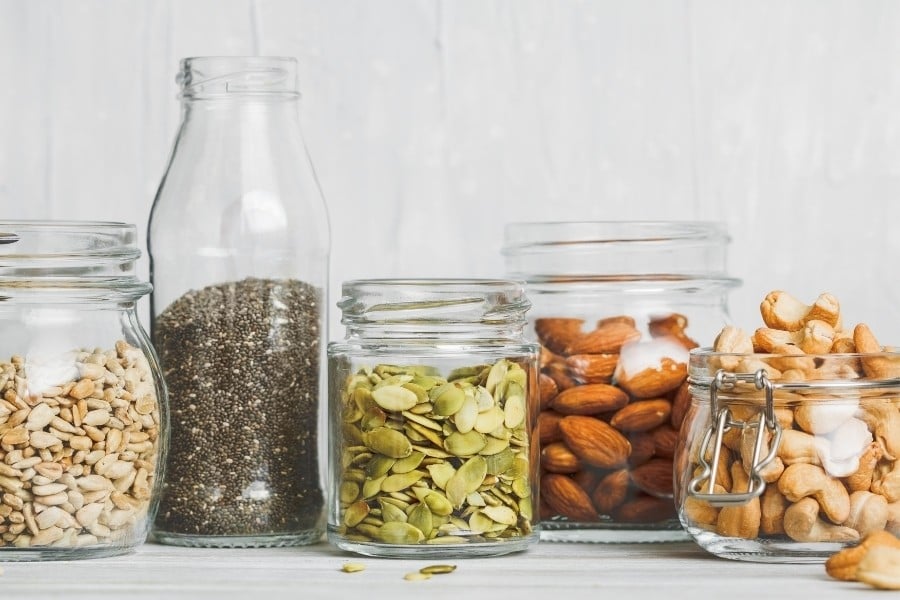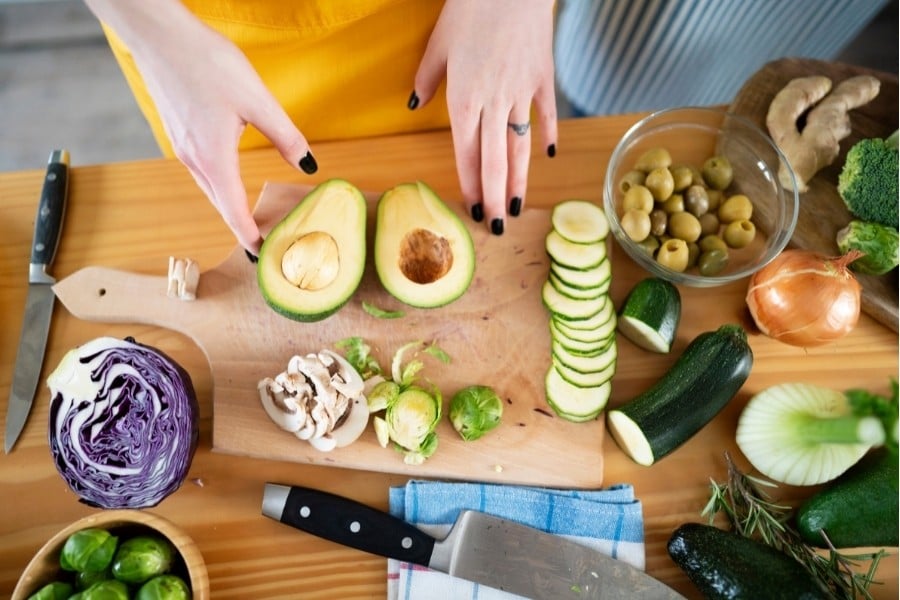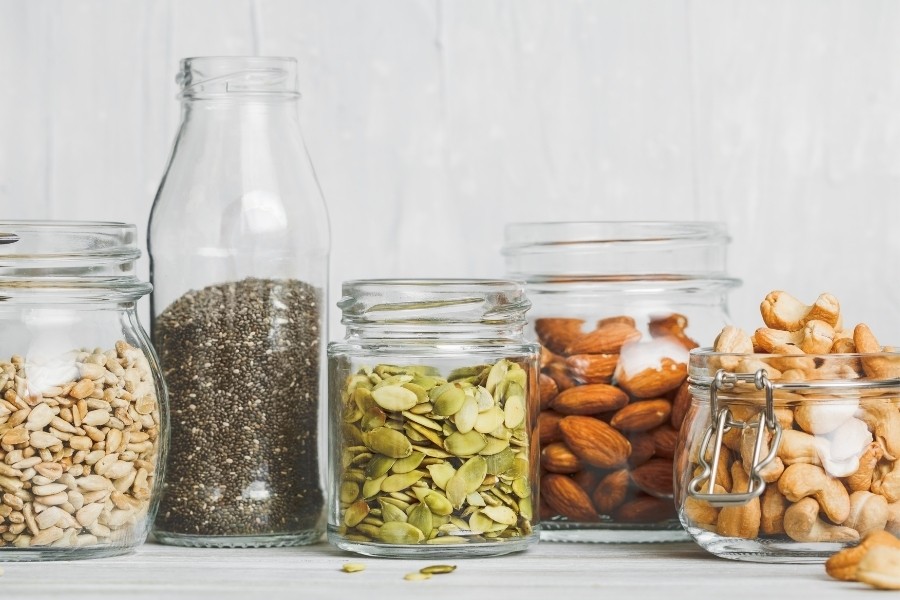Veganism and plant-based diets are big news these days. They’ve grown exponentially in popularity over the past few years! Even the big fast-food chains have gotten on board, offering more plant-based options and most grocery stores now offer a huge range of non-dairy milk and meat alternatives. Almond milk, anyone?
For some, veganism is something of a mystery. They may understand the principles of not eating meat - after all, vegetarianism has been mainstream for a while, but eliminating all animal products and by-products and eating what is essentially a plant-based diet can be a little overwhelming.
If this is you - intrigued about the big, wide world of veganism - this post is for you. We will go through what a vegan diet is and the top ten vegan foods that can improve anyone’s diet, whether you decide to follow a fully plant-based lifestyle or just incorporate a few elements. Let’s take a look.
What Does It Mean to Be a Vegan?
Veganism and plant-based diets are often used interchangeably to mean the same thing. The key difference between the two is that veganism eliminates animal products and by-products from the diet, whereas plant-based can mean mostly eating non-meat or animal products.
As a result of these factors, the vegan diet excludes all animal products, including meat, eggs, and dairy, as well as by-products such as honey.
People choose to eat a vegan diet for a variety of reasons, very often being ethical and environmental, but many also choose to follow a vegan diet to improve their health. If done properly, a vegan diet can be incredibly healthy. Some of the benefits include:
-
Lose weight more easily - possibly because of eating a diet higher in fibre, which leads to you feeling fuller for longer
-
Lowers blood sugars, therefore decreasing the chances of type II diabetes
-
May lower the risks of developing heart disease and high blood pressure
-
May lessen the chances of colon, breast, and prostate cancers, as there are no processed meats in the diet
-
Can reduce the pain associated with arthritis.
Veganism is not only about the food that is eaten. It is a whole way of life that seeks to eliminate all types of animal products, whether in the diet, clothing, or other lifestyle reasons.
What Can You Eat as a Vegan?
These foods are perfect for vegans, providing them with the range of vitamins and minerals that are needed for a healthy diet. However, they are not just for vegans - anyone can eat them!
Tofu: Tofu is a classic vegan food, and that is because it is a great way of getting protein into the diet. It is made from soy milk and undergoes a coagulation process to make it an incredibly versatile food item for vegans and those following a plant-based diet. In terms of taste and smell, it doesn’t have a strong one of its own, but that makes it great for taking on the flavors of other foods in meals such as curries. It is also great for adding to salad bowls and can be pan-fried for a bit of crispy texture, or can even be thrown into an air fryer. There is growing evidence to show that soy may help lower the risk of breast cancer.
Legumes: Otherwise known as beans, legumes are a fundamental part of a vegan diet. If you need further proof of how good they are, just look at the diets of most people aged 55 and above - they eat lots of legumes! They have been shown to significantly reduce the risk of heart disease, cancer, and diabetes. Legumes contain a variety of macro and micronutrients, including protein, iron, zinc, folate, fibre, and potassium. Some of the phytochemicals contained in legumes have been linked to antioxidant and anti-inflammatory properties, as well as aiding in the regulation of blood sugar and blood pressure, and promoting the growth of beneficial gut bacteria. It is thought that eating legumes regularly may reduce your risk of colorectal cancer by about 9–18%.

Nuts: Nuts are an incredibly versatile ingredient, whether you are a vegan or just someone who wants to eat a healthier diet. They’re especially good for vegans as they help to get a hefty dose of protein into the diet, which is one element many vegans struggle to get enough of. Most people think of peanuts when it comes to nuts, but they’re actually part of the legume family. However, there are so many nuts that you can incorporate into your diet in a variety of ways, from almond butter to almond milk. Other nuts include pine nuts, brazil nuts, cashews, pistachios, and hazelnuts.
Seeds: Seeds are a little bit like nuts in that they are a great form of protein and can be used in a plethora of ways in the diet. Sprinkle chia seeds over oatmeal made with plant-based milk such as soy, coconut, or almond milk, sprinkle flax seeds over a smoothie bowl, and use hemp seeds to add a bit of texture to a salad - or just eat them as a delicious snack on their own.
Nutritional yeast: Are you considering moving from an omnivorous diet to a vegan or plant-based diet, but love cheese and worry about replacing it? Well, that is what nutritional yeast is for. Nutritional yeast is something many non-vegans are unfamiliar with but it is a staple part of the diet. It provides a nutty and cheesy flavor to foods and, as the name suggests, is jam-packed with nutrients. Add it to sauces to make a ‘cheese sauce, or just sprinkle it in foods for a bit of nuttiness.
Seaweed: Seaweed is one of the few plant-based foods that contain DHA, which is an essential fatty acid packed with vitamins B, K, Zinc, and iron. Ones to look out for include algae such as spirulina and chlorella, which are great sources of complete protein. Seaweed contains magnesium, riboflavin, manganese, potassium, iodine, and good amounts of antioxidants.
Sprouted and fermented foods: Fermented and sprouted plant foods such as sauerkraut, tempeh, pickles, kombucha, and kimchi are good sources of probiotic bacteria, which may help improve immune function and digestive health. They also contain vitamin K2, which may promote bone and dental health as well as help decrease the risk of heart disease and cancer.
Whole grains: Whole grains, cereals, and pseudocereals such as quinoa, spelt, and teff are high in complex carbohydrates, fibre, iron, B vitamins, magnesium, phosphorus, zinc, and selenium. However, too much can sometimes cause them to be antinutrients, which means they stop the body from absorbing some key nutrients. By sprouting them or fermenting them, you can prevent this.
Fruit: Fruits should be a key part of anyone’s diet - there’s a reason why it’s known as nature’s candy! Many vegans, especially new ones, turn to processed junk food to make up for the things that they can’t eat, but fruits can be a great way to add sweet and delicious healthy food to your diet. Bananas, for example, can be frozen and blended with other ingredients, like non-dairy milk, nut butter, and some cocoa powder to create banana ‘ice cream’.
Vegetables: Along with fruit, vegetables should be a core part of every person’s diet. Mushrooms and eggplants are an ideal way to recreate a ‘meaty texture in pasta and hearty dishes. Cauliflower can even be turned into mock “chicken wings” and coated with buffalo sauce for a seriously drool-worthy appetizer. Vegans should be trying to incorporate leafy greens such as spinach, kale, and bok choi to ensure they are getting plenty of calcium and iron.
Difference Between a Vegan & a Vegetarian?
Some people are not quite sure of the differences between vegan and vegetarian diets, often thinking vegan is short for vegetarian. However, there are some fundamental differences between the two.
Vegetarians do not eat any meat, game, poultry, fish, or by-products of animal slaughter. However, many will consume dairy, eggs, and honey. A vegan will eat none of these and will not wear leather or other products made from animals.
It does not have to be all or nothing, though; there are plenty of ways in which you can incorporate elements of veganism into your diet to reduce the number of animal products that you consume and to make improvements to your health.

For example, you could follow a ‘flexitarian’ diet, where sometimes you follow a vegetarian/vegan diet and other days you don’t. This can be a good compromise for someone who is not entirely ready to go the whole way just yet. Many people opt to start with ‘Meatless Mondays’, where on Mondays they refrain from eating meat or animal products and build on from there.
By creating your own roadmap when it comes to switching over to a vegan or a plant-based diet, and being realistic about what you want to achieve, you will be more satisfied with making the change. You will also be more likely to stick to it if you have gone at your own pace.
Professional Advice
When you are looking at making a big change to your diet, it is a good idea to get some advice from a professional. At HealthOne, we have our own dietitian, Trista Chan, who can work with you to create a seven or fourteen-day meal plan to make sure that your body is getting all the nutrients that it needs while remaining delicious too. It’s a great resource for helping you to get started on your journey to better health and a plant-based vegan diet.
Whether you decide to lead a completely vegan lifestyle or choose to eat fewer animal products and more plant-based foods, this list of ten vegan foods should help you on the way. Plants are an incredible source of the nutrients and vitamins that our bodies need to grow, develop, and work to the best of their ability. Combined with professional advice from a HealthOne dietician, you can be on your way to living and eating well.
One Life. Live Inspired.




